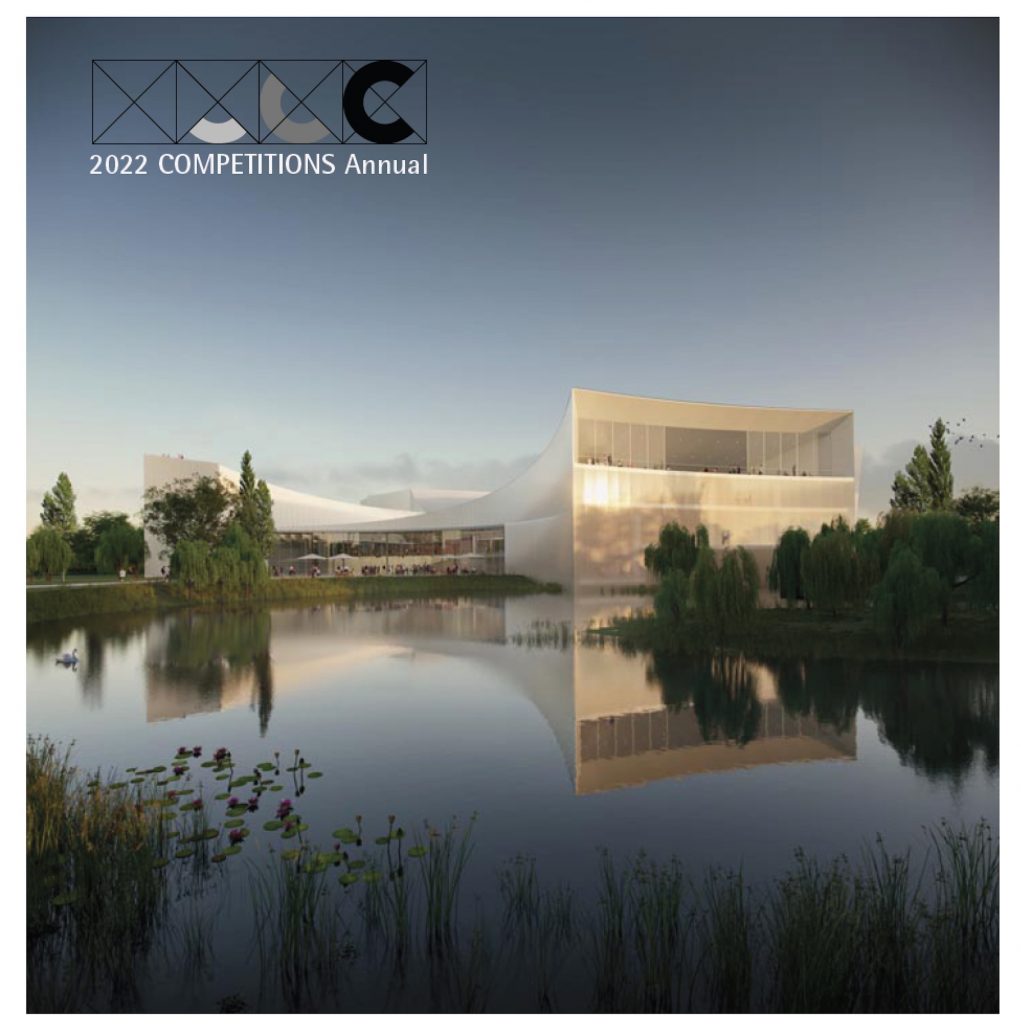Minimal Shelter Space International Design Competition Proposals for improving evacuation environment inside Japanese evacuation centers Sponsor: Alliance for Humantarian Architecture
Type: International, open, ideas
Fees: none
Languages: Japanese and English
Locaton: Sendai, Japan
Introduction
Record-breaking rainfall and subsequent flooding, hurricanes, earthquakes, volcano eruptions, heatwaves, and forest fires, humanity is experiencing devastating natural disasters with no signs of easing. Our homes built to protect us from harsh nature are becoming less effective, and in some cases, we have to abandon our homes for survival, whether temporal or permanent. It is becoming ever more critical to prepare for such dire situations at the best of our abilities. Japan, one of the countries consistently under the threat of various disasters all year long, has experienced many throughout the years. Through these devastating experiences, the government has developed standard disaster evacuation guidelines. Based on the current guidelines, how much of this deals with spatial conditions of evacuees is still questionable. Are we still left to sleep on cold school gymnasium floors next to a stranger without privacy? Typically in Japan, public facilities (primarily elementary schools) serve as evacuation centers for that school district community, but are also open to anyone in need nearby. Evacuees of all ages and family structures coming there are squeezed into the school gymnasium, spending nights there on the hardwood floor. There is need for improving this inhumane condition among individuals and groups. We are starting to see a few evacuation centers with cardboard beds and partitions. Alliance for Humanitarian Architecture would like to start a conversation about the spatial environmental conditions during evacuation in Japan through this competition and share our current situations and ideas for improvement. We look forward to seeing a submission from all over the world with diverse yet realistic ideas. Schedule:
October 3, 2021 – Competition announcement (Registration)
December 10, 2021 – 1st stage submission deadline
December 19, 2021 – Announcement of the finalists
January 14, 2022 – Submission of finalists built projects
January 15 to 27, 2022 – Exhibition of submission panels and finalist projects
January 22, 2022 – Competition Final, symposium, award ceremony Assignment: - Submit proposals for private space of 2m x 2m x 2m (4㎡) per person inside a school gymnasium in Japan during disaster evacuation.
- Duration for the use of 10 continuous days or more.
- Construction (material) costs should be under 30,000JPY with materials available in Japan.
All competition participants must register through Alliance for Humanitarian Architecture’s competition website. If you are participating as a team, please fill in the representing team member, and fill the other team members name at the affiliation section. Once the registration is completed, a registration number will be emailed to your registered email address. Please submit your proposals with this number, and do not include any names that reveal the individual or affiliation in your submission. Registration:
All competition participants must register through Alliance for Humanitarian Architecture’s competition website. If you are participating as a team, please fill in the representing team member, and fill the other team members name at the affiliation section. Once the registration is completed, a registration number will be emailed to your registered email address. Please submit your proposals with this number, and do not include any names that reveal the individual or affiliation in your submission. Submission Requirements
Diagram showing how to affix entry number to submission. First Stage:
1 : One A1 size board (vertical) with sketches, drawings, illustrations describing your proposal. Submission to be in PDF data (under 20MB). No physical panel submissions accepted.
2 : Design statement (A4/1page, font size 11point)
※Finalists and notable projects will be selected during the 1st stage for the panel exhibition in January.
Final stage:
The selected finalist will be physically built and showcased in public at the Sendai Forus gallery “TURN ANOTHER ROUND” for the final and public selection process.
The final presentation in front of the jury, followed by a symposium, is scheduled for January 22, 2022, in Sendai, Japan. All selected finalists must be available for their final presentation either in person or virtually through video conferencing. Each finalist will receive 50,000JPY for traveling and accommodation to Sendai Judging criteria:
Judging will rely on the values of each judge, but will mainly focus on; practicality, ease of assembly, comfort during all seasons, the flexibility of configuration and use, safety, number of parts, weight, reusability, longevity, aesthetics, storage, and distribution logistics.
Awards:
Grand award (1) Certificate of Merit, 100,000JPY (approx. USD900), Gift
Award of excellence (3) Certificate of Merit, Gift Other requirements and notes:
Due to travel restrictions imposed by the Japanese government under the COVID-19 pandemic, all finalists must submit building instructions to construct the design. As such, specified materials must be available in Japan or delivered by the later instructed date.
Jury:
1st stage – Alliance for Humanitarian Architecture
Final stage – TBA (public voting will take place during the first half of the exhibition)
Contact information:
competition2022@ahajapan.org
Any inquiries regarding the competition, please contact the competition organizer at the following email address. Alliance for Humanitarian Architecture competition2022@ahajapan.org Website:
https://en.allianceforhumanitarianarchitect |
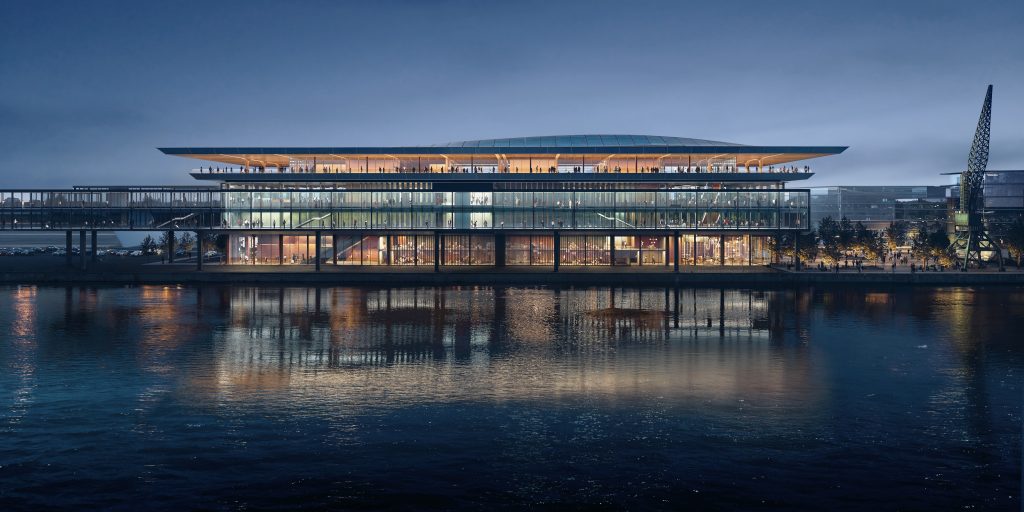
1st Place: Zaha Hadid Architects – night view from river – Render by Negativ
Arriving to board a ferry boat or cruise ship used to be a rather mundane experience. If you had luggage, you might be able to drop it off upon boarding, assuming that the boarding operation was sophisticated enough. In any case, the arrival experience was nothing to look forward to. I recall boarding the SS United States for a trip to Europe in the late 1950s. Arriving at the pier in New York, the only thought any traveler had was to board that ocean liner as soon as possible, find one’s cabin, and start exploring. If you were in New York City and arriving early, a nearby restaurant or cafe would be your best bet while passing time before boarding. Read more… Young Architects in Competitions When Competitions and a New Generation of Ideas Elevate Architectural Quality 
by Jean-Pierre Chupin and G. Stanley Collyer
published by Potential Architecture Books, Montreal, Canada 2020
271 illustrations in color and black & white
Available in PDF and eBook formats
ISBN 9781988962047
Wwhat do the Vietnam Memorial, the St. Louis Arch, and the Sydney Opera House have in common? These world renowned landmarks were all designed by architects under the age of 40, and in each case they were selected through open competitions. At their best, design competitions can provide a singular opportunity for young and unknown architects to make their mark on the built environment and launch productive, fruitful careers. But what happens when design competitions are engineered to favor the established and experienced practitioners from the very outset? This comprehensive new book written by Jean-Pierre Chupin (Canadian Competitions Catalogue) and Stanley Collyer (COMPETITIONS) highlights for the crucial role competitions have played in fostering the careers of young architects, and makes an argument against the trend of invited competitions and RFQs. The authors take an in-depth look at past competitions won by young architects and planners, and survey the state of competitions through the world on a region by region basis. The end result is a compelling argument for an inclusive approach to conducting international design competitions. Download Young Architects in Competitions for free at the following link: https://crc.umontreal.ca/en/publications-libre-acces/ 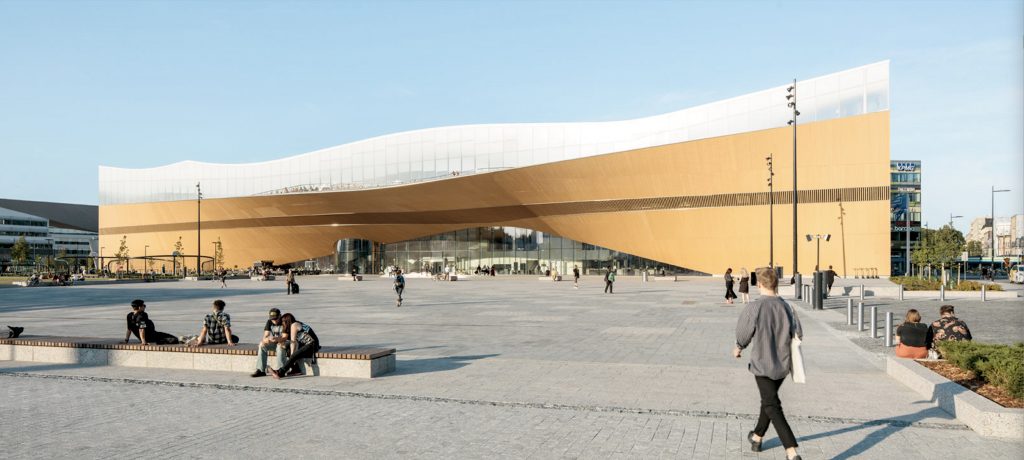
Helsinki Central Library, by ALA Architects (2012-2018)
The world has experienced a limited number of open competitions over the past three decades, but even with diminishing numbers, some stand out among projects in their categories that can’t be ignored for the high quality and degree of creativity they revealed. Included among those are several invited competitions that were extraordinary in their efforts to explore new avenues of institutional and museum design. Some might ask why the Vietnam Memorial is not mentioned here. Only included in our list are competitions that were covered by us, beginning in 1990 with COMPETITIONS magazine to the present day. As for what category a project under construction (Science Island), might belong to or fundraising still in progress (San Jose’s Urban Confluence or the Cold War Memorial competition, Wisconsin), we would classify the former as “built” and wait and see what happens with the latter—keeping our fingers crossed for a positive outcome. Read More… 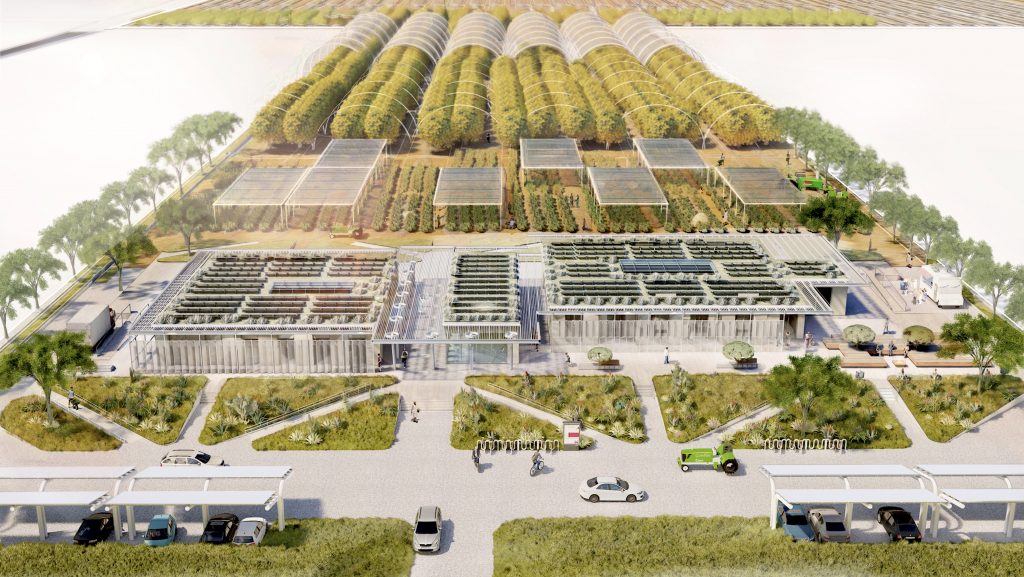
2023 Teaching and Innovation Farm Lab Graduate Student Honor Award by USC (aerial view)
Architecture at Zero competitions, which focus on the theme, Design Competition for Decarbonization, Equity and Resilience in California, have been supported by numerous California utilities such as Southern California Edison, PG&E, SoCAl Gas, etc., who have recognized the need for better climate solutions in that state as well as globally. Until recently, most of these competitions were based on an ideas only format, with few expectations that any of the winning designs would actually be realized. The anticipated realization of the 2022 and 2023 competitions suggests that some clients are taking these ideas seriously enough to go ahead with realization. Read more… 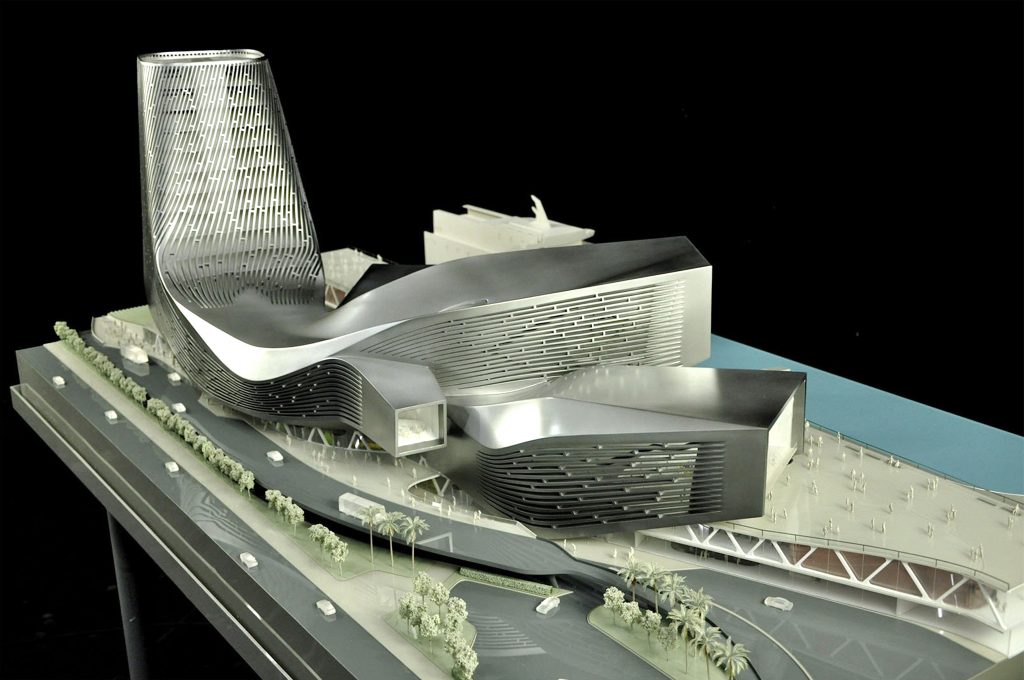
RUR model perspective – ©RUR
New Kaohsiung Port and Cruise Terminal, Taiwan (2011-2020)
Reiser+Umemoto RUR Architecture PC/ Jesse Reiser – U.S.A.
with
Fei & Cheng Associates/Philip T.C. Fei – R.O.C. (Tendener)
This was probably the last international open competition result that was built in Taiwan. A later competition for the Keelung Harbor Service Building Competition, won by Neil Denari of the U.S., the result of a shortlisting procedure, was not built. The fact that the project by RUR was eventually completed—the result of the RUR/Fei & Cheng’s winning entry there—certainly goes back to the collaborative role of those to firms in winning the 2008 Taipei Pop Music Center competition, a collaboration that should not be underestimated in setting the stage for this competition Read more… 
Winning entry ©Herzog de Meuron
In visiting any museum, one might wonder what important works of art are out of view in storage, possibly not considered high profile enough to see the light of day? In Korea, an answer to this question is in the making. It can come as no surprise that museums are running out of storage space. This is not just the case with long established “western” museums, but elsewhere throughout the world as well. In Seoul, South Korea, such an issue has been addressed by planning for a new kind of storage facility, the Seouipul Open Storage Museum. The new institution will house artworks and artifacts of three major museums in Seoul: the Seoul Museum of Modern Art, the Seoul Museum of History, and the Seoul Museum of Craft Art.
Read more… |



























